Throughout the 53-year history of the Philadelphia Flyers, there have been 21 men to perform the duties of head coach. Some have stuck around for plenty of successful years, while others were shown the door before they’d even coached a full season.
Heading into the 2019-20 NHL season, Alain Vigneault became the latest addition to the Flyers’ coaching legacy. He joins a list of Stanley Cup-winning coaches, Hall of Famers, and NHL legends.
Short Term Answers
Like most teams, the Flyers have had their share of coaches who have filled in the blanks. They might have been an interim option brought in after another coach was fired, or they simply had a short tenure with the team.
Related: Top 5 Coaches of the Decade
The Flyers have had roughly four of these short-term coaches including, Terry Simpson, Wayne Cashman, Craig Ramsay, and Scott Gordon.
The late Bill Dineen also only coached the team for one season after taking over midseason. In his short time, however, he had the chance to coach his son Kevin as well as Eric Lindros in his rookie year.
Craig Ramsay is the shortest tenured Flyers coach of all-time by a wide margin. He was behind the bench officially for 28 games.
The most recent short-term coach was Scott Gordon. After filling in for the final 51 games of the 2018-19 season as interim coach, Gordon was sent back down to continue coaching the Lehigh Valley Phantoms of the AHL where he’s been since 2015.
Keith Allen
There are few names in the history of the Flyers that mean more to the franchise than Keith Allen. The late legend and Hall of Famer took over as the Flyers’ coach upon their introduction to the NHL in 1967.
After two seasons behind the bench and 150 games, Allen notoriously made the switch to general manager. He stayed in that position for the next 14 years, becoming one of the best GMs in franchise history.
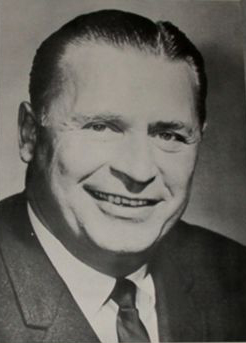
Allen’s managing career outshined his coaching career, as he was behind the scenes for the Flyers’ back-to-back Stanley Cups.
Vic Stasiuk
Once Allen left the helm as coach, Vic Stasiuk was next in line. Stasiuk enjoyed a long professional playing career and immediately made the switch to coaching. After several seasons of coaching in the EHL, he was hired by the Flyers.
For the next two years, Stasiuk earned just 45 wins in 154 games as well as one unsuccessful trip to the playoffs before being fired in 1971. He found work quickly, however, joining the California Golden Seals as head coach the same year.
Fred Shero
It’s hard to discuss the Flyers’ history and not spend a good deal of time on the late legend and Hall of Fame coach, Fred Shero. To this day, Shero remains the longest-tenured Flyers coach, with 554 regular season and 83 postseason games across seven seasons.
Related: First Jeff Carter Trade Revisited
Shero helped the Flyers earn their first playoff series victory in 1974 after leading his team to a 50-win season; the first time the franchise won more than 37 games and one of his three consecutive 50-plus-win seasons with the Flyers. He’s known for much bigger victories, though.
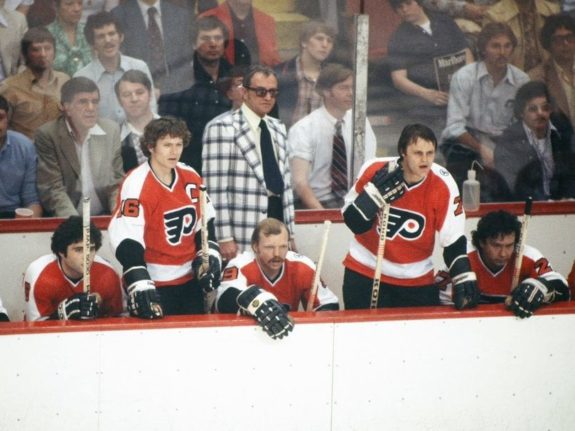
Leading the helm of the 1974 and 1975 Stanley Cup-winning teams cemented him as one of the franchise’s most legendary coaches.
Shero’s accolades with the Flyers seem endless, including winning the Jack Adams Award in its inaugural year. No matter the names that came before or after him, Shero will always be considered one of, if not the best Flyers coach of all time.
Bob McCammon and Pat Quinn
The next four years were bizarre. When Shero went on to coach the New York Rangers in 1978, Bob McCammon became the Flyers’ new head coach. After 50 games in the 1978-79 season, Pat Quinn took over.
Quinn had two very successful full seasons in Philadelphia, accumulating 141 wins in 262 regular-season games. He also added a Stanley Cup Final appearance and a Jack Adams Award during the 1979-80 season.
When 1982 rolled around, McCammon was recalled from his role with the Flyers’ AHL affiliate, the Maine Mariners, to coach in Philadelphia again. Finishing out the last eight games of the 1981-82 season, McCammon had two more solid seasons with the Flyers, losing in the second round of the playoffs in both years.
Quinn went on to become one of the winningest coaches in NHL history. McCammon finished his tenure with Flyers in 1983-84, serving as both head coach and GM before continuing his career with the Edmonton Oilers and Vancouver Canucks.
Mike Keenan
The back-and-forth era of McCammon and Quinn was followed by another Jack Adams-winner and legendary NHL coach. After a few successful years in the AHL, Mike Keenan finally made his jump to the NHL with the Flyers in 1984.
Keenan spent four seasons in Philadelphia, winning 190 regular-season games, two Patrick Division titles, and had two unsuccessful trips to the Stanley Cup Final.
Related: Boston Bruins Coaching History
He had a long career coaching in the NHL, but Keenan and the Flyers cut ties in 1988 after a second-round playoff exit and the emergence of stories about friction in the locker room.
Paul Holmgren
Paul Holmgren was named the Flyers’ new head coach in 1988 after three years serving as Keenan’s assistant. He kept that role for the next four years before being fired and replaced by Bill Dineen in the 1991-92 season.
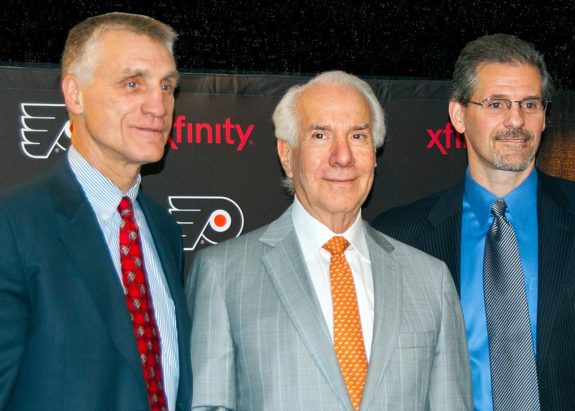
Holmgren’s coaching days in Philadelphia were fairly forgettable as he never managed to finish above the .500 mark and earned just one trip to the postseason in four seasons.
Terry Murray
After the days of Dineen and Terry Simpson, former Golden Seals head coach Terry Murray was next in line for the Flyers’ coaching job.
Murray brought new life to the Flyers after they had missed the postseason for five seasons. He came on during the lockout of 1994-95, yet still led the Flyers to an Atlantic Division title and a Conference Final appearance.
He earned back-to-back 45-win seasons, another division title, and a Stanley Cup Final appearance in 1997. However, after the Flyers were swept in the Final, Murray was fired and took over as the head coach of the Florida Panthers. The Flyers brought him back on as an assistant from 2003 to 2008.
Roger Nielson
Wayne Cashman’s time in Philadelphia did not last long, 61 games to be exact. Once he was gone, the St. Louis Blues’ assistant Roger Neilson was brought aboard to finish out the 1997-98 season.
Neilson, one of the great coaches and characters of the game, lasted just two full seasons with the Flyers. Things came to a bumpy end when Neilson returned to the Flyers from cancer treatment only to be denied his position by Bobby Clarke, citing his health as a concern. Craig Ramsay took over the coaching duties during the Flyers’ 2000 Conference Final run. Neilson then moved on to the Ottawa Senators and Ramsay was promoted from interim to head coach, which, as we all know now, didn’t last long.
Bill Barber
With Neilson out, Clarke and the Flyers turned to a familiar face to take over. After his years playing with the franchise, Bill Barber served as a Flyers assistant coach under Keenan from 1985 to 1988 before serving as head coach for five seasons in the AHL.
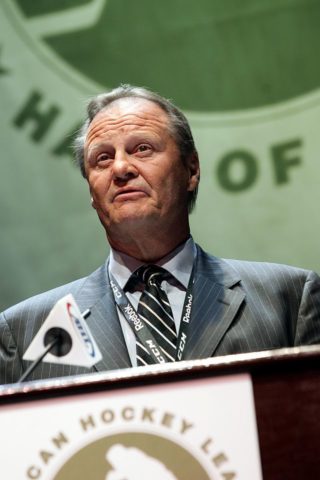
After finishing out the 2000-01 season with 31 wins in 54 games and a trip to the playoffs, Barber earned the Jack Adams Award; the fourth in franchise history. He was officially named head coach the next year, but after a postseason collapse, the Flyers let Barber go, formally ending his coaching career.
Ken Hitchcock
Following Barber, the Flyers continued the trend of familiar names behind the bench. Ken Hitchcock had been an assistant with the Flyers during the Holmgren/Dineen days. He earned his first NHL head coaching job with the Dallas Stars and became a Stanley Cup Champion in 1999.
He was released from his duties with the Stars in 2002, and returned to Philadelphia, this time as head coach.
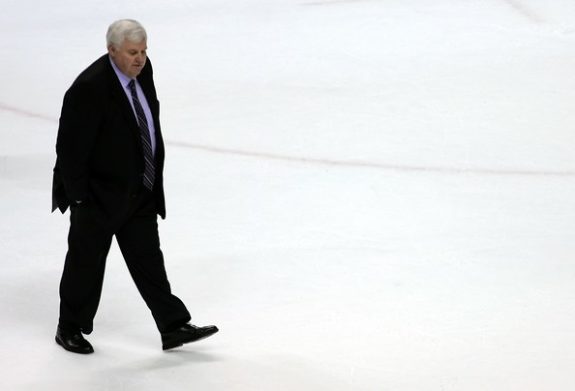
Hitchcock’s Flyers teams were solid in each of his three years. He led them to 40-plus-win seasons in each and was one game away from the Stanley Cup Final in 2004. Two years later, during the 2006-07 season, Hitchcock only lasted eight games before he was fired.
John Stevens
John Stevens took over for Hitchcock after eight years with the Phantoms as both an assistant and head coach.
The Flyers missed the playoffs the year Stevens took over but made it to the Conference Final the very next year in 2008. Fast forward two years and Stevens was yet another fired Flyers head coach, making it through just 25 games of the 2009-10 season.
Stevens then joined Los Angeles Kings the next season and led them to a Stanley Cup victory after being promoted to head coach during the 2011-12 season.
Peter Laviolette & Craig Berube
The Flyers seemed to have struck gold when they brought Peter Laviolette aboard in 2009-10. He was a former Stanley Cup Champion with the Carolina Hurricanes and led them to the Stanley Cup Final in his first year with the team.
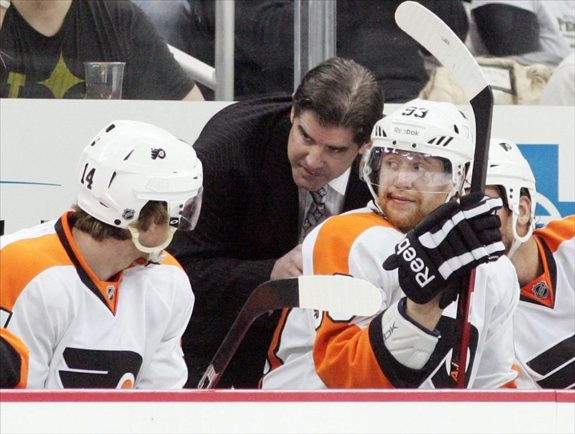
Despite his 168 wins with the Flyers and a division title in 2011, Laviolette’s time with the Flyers never got easier after that 2010 run.
His players seemed to have lost their faith in him, and then general manager Paul Holmgren believed it was time for a change. He fired Laviolette after three games in 2013 and promoted assistant coach Craig Berube to head coach.
Berube’s time as the Flyers’ head coach didn’t last long, just two seasons. He coached 161 regular-season games, winning 75 of them. His time in Philadelphia was clearly a poor indication of his coaching skills, as he proved his success as a coach during last season’s Cup win with the Blues.
Dave Hakstol
There aren’t too many positives to take out of Dave Hakstol’s four-year run with the Flyers. After moving from the NCAA to the NHL in 2015, Hakstol’s team broke into the top three of the Metropolitan Division just once. Fans had been calling for a head coaching change before the Flyers eventually cleaned house last season. Scott Gordon did a solid job last year as interim head coach, but returned to his role with the Phantoms, creating a vacancy in Philadelphia.
Alain Vigneault
Alain Vigneault was called on to fill that vacancy. It seemed like GM Chuck Fletcher was taking a risk when he brought Vigneault on board, but so far, it has paid off for the Flyers.
Before the pause of the 2019-20 season, Vigneault and the Flyers had climbed into second place in the Metro Division, with bright playoff hopes ahead of them.
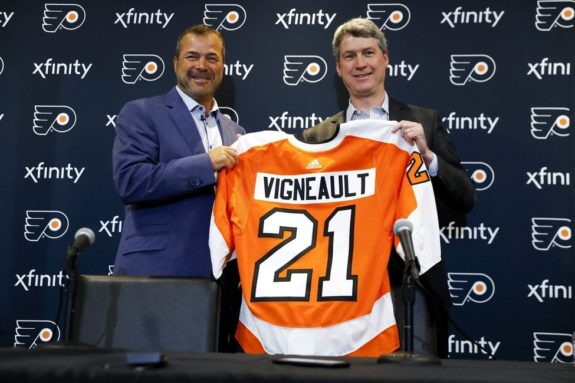
With a five-year deal in his pocket, it seems as though he’ll be around for the foreseeable future. He’s brought invaluable experience and previous success to his new team, and considering the course of his first season with the Flyers, there is no reason that Vigneault won’t find some of that same success in Philadelphia.